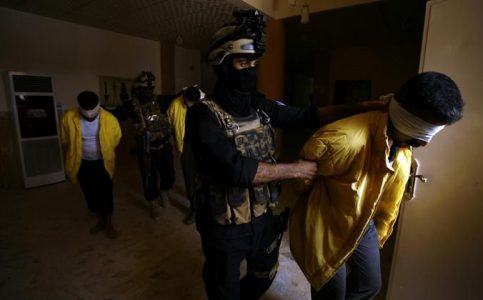
Iraqi authorities to handle foreign ISIS terrorist trials
Now that the Islamic State (IS) is considered largely contained, the next challenge is what to do with the thousands of jihadis captured and awaiting trial, many of them in Iraq.
In addition to thousands of its own people imprisoned for fighting for IS, Iraq is under pressure to receive and try some 1,000 foreigners in the hand of Syrian Kurds. It would seem expedient to try the detainees there, rather than shipping them back to the roughly 50 other countries involved. Paris doesn’t want these fighters back and French President Emmanuel Macron, for one, thinks the trials should be conducted in Iraq — except for the strong possibility Iraq will sentence many of them to death.
The Iraqi judiciary often issues death sentences against IS members. France outlawed the death penalty in 1977. In January 2018, French officials threatened to intervene should death sentences be issued against two extremist French nationals. Yet Macron now says French IS fighters who were captured in Iraq and Syria must be tried in the countries where they face charges.
A judicial source told Al-Monitor that Baghdad is preparing to try French nationals “who fought alongside IS in Iraq and Syria and who were arrested by the Syrian Democratic Forces in Syria a few weeks ago.” So far there are about a dozen, but more are expected.
Watheq al-Hashemi, president of the Iraqi Group for Strategic Studies, told Al-Monitor that Iraqi President Barham Salih also thinks the trials should take place in Iraq. However, Iraq is concerned with the financial burden of handling 1,000 prisoners and is seeking about $2 billion from the other countries to cover the costs.
Iraqi officials also worry about Iraqi prisons becoming recruiting ground for IS or other terrorist groups.
Former Iraqi parliament member Rezan Sheikh said she fears IS will restructure itself inside Iraqi prisons.
“Our prisons have many problems and are not correctional facilities. And they can easily lead to the creation of a new terrorist organization, which is why Iraq should not accept this deal,” she told Al-Monitor.
Al-Monitor received information that in Iraq, overcrowding in prisons and detention centers exceeds 120%. Iraq doesn’t have new prisons and detention centers that match the international standards France and other countries will want Iraq to meet.
Hisham al-Hashemi, a researcher at al-Nahrain Center for Strategic Studies, also warned that Iraqi prisons could become like Bucca Camp, where terrorist organizations were born.
“It’s not in Iraq’s interest to try [foreign IS] members inside Iraq. Issuing death penalties against such members will lead international human rights organizations to side against Iraq, and keeping them in prison will give them an opportunity to shuffle their cards,” he told Al-Monitor.
Razaw Salihy, an Amnesty International campaign leader, concurred, telling Al-Monitor, “We met many families who said that their male relatives had joined IS after being held in prisons such as the Bucca Camp.”
The French government is facing pressure from several media outlets and human rights organizations that question the fairness of the Iraqi judiciary and reject the death penalty. So, even though France wants Iraq to keep French nationals, the public wants Macron to pressure Iraq to not sentence them to death.
“Based on what we have seen in recent years, the death penalty is very likely,” Salihy added. “Iraq remains among the countries that resort to the death penalty the most. Authorities [there] often respond to terrorism-related attacks by announcing executions.”
The concerns of human rights organizations seem justified, given Salih’s statements during a Feb. 25 visit to Paris that the convicted in Iraq may face execution. The prisoners “will be tried according to Iraqi law,” he said.
Source: Al Monitor





